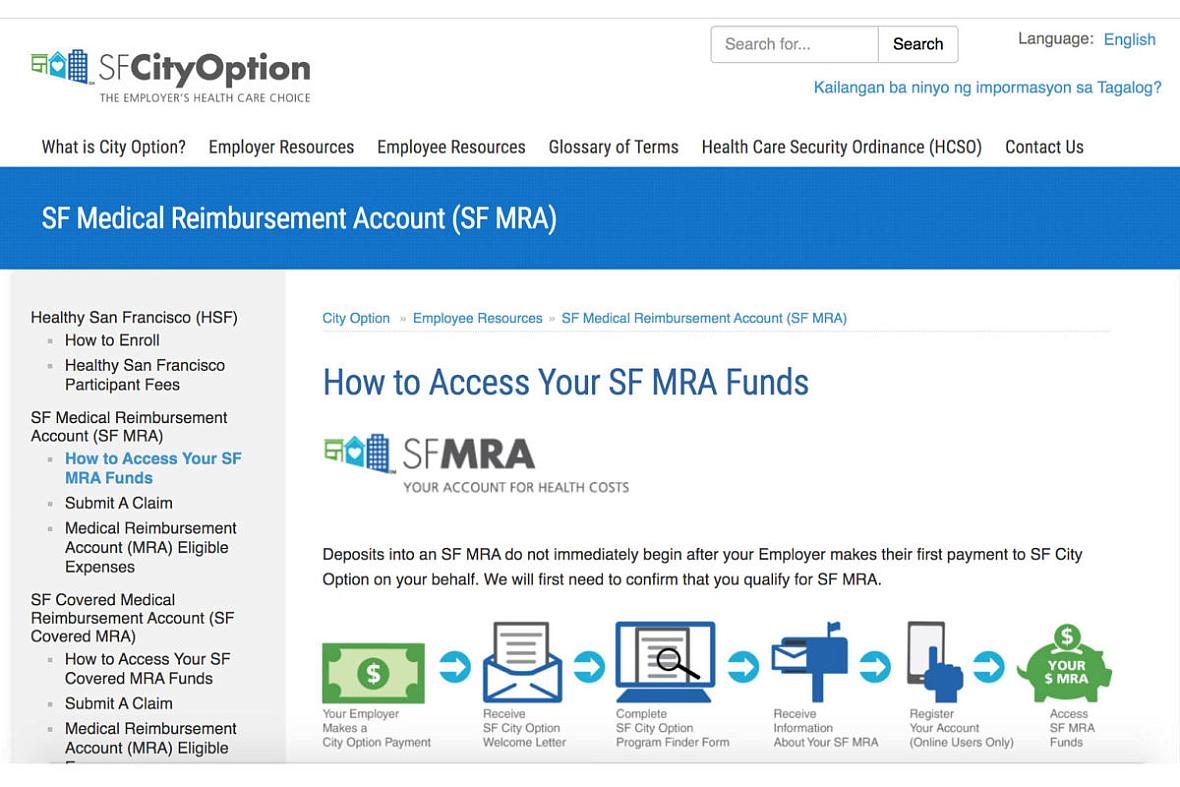Workers may get cash payout from medical reimbursement accounts
This story was produced by Ida Mojadad, a participant in the 2019 Data Fellowship, who is investigating health care on the local level and the efficacy of Healthy SF.
Her other stories include:
Millions left sitting in medical reimbursement accounts by city workers
Pandemic highlights need for San Francisco’s health ‘program of last resort’

The City Option program provides medical reimbursement account financed by deposits from employers.
(Examiner screenshot)
Though the amount may be less than what was originally promised, San Francisco workers with a city medical reimbursement account have until the end of the year to cash in to help with coronavirus-related expenses.
People with at least $100 in their City Option MRA accounts, which employers must pay into under a 2006 law intended to ensure all workers have health access, are eligible to receive a $500 bonus. Workers who haven’t received a letter about the bonus by the end of September are encouraged to call the customer service line.
Eligible workers must confirm their identity and attest that they and their families are in financial need of the bonus for personal, family, living or funeral expenses incurred by the pandemic after March 12. They must also attest that no one in the family will receive insurance or compensation from other sources for the same expenses.
The grant does not alter the account balance and comes through as a separate payment to direct deposit if set up, or a check, according to a City Option customer service representative. (FULL DISCLOSURE: This reporter, like many other people, has an eligible account.)
As of Oct. 1, more than 21,000 account holders have received $10.7 million. Roughly 46,000 people are eligible for the grant, which is funded by MRA accounts closed to inactivity, according to the Mayor’s Office.
Unfortunately, the payments being disbursed are in some cases a far cry from what was originally promised. In April, Mayor London Breed announced that some $138 million held in more than 100,000 accounts reserved for health expenses would be freed up for use on food, rent and other basic needs during the pandemic emergency.
The changes in the plan after it was already publicized have been attributed to legal constraints.
“It’s an incredibly complicated legal terrain,” said Supervisor Hillary Ronen. “The guess is that they’re trying to strike a very careful balance to make sure we’re not violating laws while allowing workers to use those accounts in the ways that they most need right now to be healthy and safe. In these times, it should be really easy.”
Ronen added that her office is looking at how to make those funds more accessible, like through a debit card. City Option holders must currently pay for eligible health care expenses upfront and be reimbursed by submitting online receipts and documentation, often with the name and cause spelled out.
While Jay Cheng, policy director for the Chamber of Commerce, said the $500 bonus would surely be appreciated by many, the policy reversal serves as a reminder that the program medical reimbursement account program isn’t fully functional or transparent.
“I think the grant reminds us how broken this system is,” Cheng said. “[Employees] need it now and the money is not there. There’s deep reform needed in this program.”
For The City to free up the funds, it would take changing the health care law through the Board of Supervisors, according to the Mayor’s Office. The City Attorney’s Office was not able to confirm the legal constraints or path forward by press time.
But there does seem to be an appetite to make some changes.
Supervisor Gordon Mar, who was disappointed by the MRA change, said the umbrella program, Healthy San Francisco, needs to be strengthened in response to the pandemic and threats to the Affordable Care Act. Healthy SF is a health access program that offers limited services to residents ineligible for state programs like MediCal and who have greater needs than the reimbursement program can provide.
“Healthy SF is more critical than ever today,” Mar said. “If [ACA] is repealed, we’re going to see a huge surge in need of enrollment for Healthy SF. I think we absolutely need to look at strengthening and expanding Healthy SF in light of the growing, and really ballooning need for healthcare support.”
The Examiner is working on a series of stories related to Healthy San Francisco. If you use the program currently or have in the past, we want to hear your story. To share your experience or ask questions about the project, email HealthySFproject@gmail.com or call/text 415-295-6603 in either English or Spanishfill out this survey.
This article was produced with support from the USC Annenberg Center for Health Journalism’s 2019 Data Fellowship. The Center’s engagement editor, Danielle Fox, contributed engagement support to this article.
[This article was originally published by The Examiner.]

